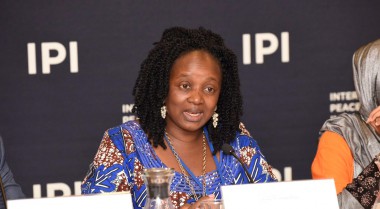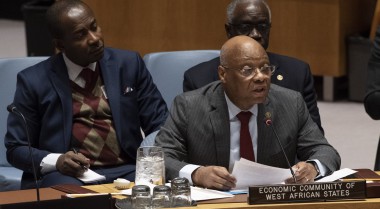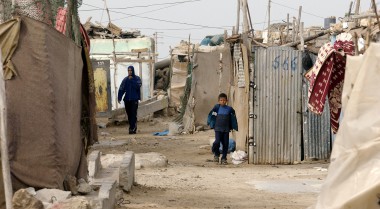Latin American & Caribbean Cooperation in the Era of COVID-19: Glimmers of Hope for Kickstarting Regional Organisations
The COVID-19 pandemic is wreaking havoc across Latin American and Caribbean (LAC) countries – exacerbating existing inequalities and crises, shrinking space for civic action and community resilience, and deepening poverty within a context of sinking economic growth. This shock could provoke another "lost decade" for the region, whose annual GDP rate for 2020 is projected at -8.1 percent – the lowest among all regions of the world.
As multiple and intertwined crises unfold in LAC, a coordinated regional response could support individual governments from the heavy burden of growing challenges.
LAC's long history of regional cooperation and integration in social areas such as health, education and migration demonstrates that, in the past, regional governance has effectively helped the region overcome crises. Examples include the Union of South American States' (UNASUR) coordination of aid to Haiti, following the earthquake that devastated the country in 2010, and the Central American Integration System (SICA)’s support to Honduras in the aftermath of Hurricane Mitch, in 1998. In addition to responses to specific situations, some of the region's organizations developed promising frameworks to tackle complex challenges, from boosting transnational environmental conservation (as in the case of the Amazon Treaty Cooperation Organization - ATCO) to supporting peace negotiations through groups of guarantor states.
Regional cooperation in LAC is not entirely a story of the past. For instance, earlier this year, SICA developed a Regional Contingency Plan that led to the purchase of 180,000 COVID-19 tests for distribution across countries, using funds from the Central American Bank for Economic Integration.
Yet, there is still a lot of work to be done to ensure that LAC's regional organizations are credible, effective, inclusive, and consistent, and advance common objectives despite the contrasting political agendas of their member states.
While LAC has considerable institutional capacity at the regional level, including the Organization of American States (OAS), the Southern Common Market (Mercosur), SICA and the Caribbean Community (CARICOM), regionalism is facing its own deepening crisis, in which a pre-existing process of gradual erosion of regional arrangements and cooperation channels is fast intensifying. At present, several political, geopolitical, and economic challenges hamper regional cooperation in LAC.
First, political forces – both within and beyond LAC – weaken regionalism. Some political leaders have prioritized advancing bilateral relations at the expense of regional integration and dialogue; others have all but withdrawn from regional efforts. The failure to find a LAC-led multilateral, peaceful solution to the Venezuelan crisis illustrates the distrust and unwillingness of many of the region's states – including its largest economies – to rely on regional cooperation. Disunity at multiple governance levels, along with fragmentation fueled by contrasting political agendas, hinder the regional organizations’ ability to handle both slow-onset challenges, such as climate change, and acute crises, such as COVID-19 and displacement.
Second, a chronic lack of resources prevents any meaningful strengthening of regional organizations. In addition to the challenge of advancing policy implementation and programmatic work, the resource gap has often made LAC regional organizations unable to retain long-term staff, which severely limits their human capacity and their overall ability to be effective and innovative.
Lastly, regional organizations are as strong as their member states want them to be. The unwillingness of national governments to design explicit mandates to allow regional organizations to handle transnational challenges, restricts their ability to support governments in adopting coordinated approaches to address regional problems, including the ongoing Venezuelan crisis. In the absence of robust and insulated institutional structures, geopolitical meddling and unilateral impulses compound this problem.
Yet not all hope is lost
There is space for regional arrangements to be better utilized so as to develop effective and coordinated responses, especially in areas such as health and migration – where specific, thematic efforts have been taking shape that could provide a basis for kickstarting regionalism once again.
Namely, cross-border networks of civil society organizations, academia, experts, practitioners and policymakers – some of them set up within the context of regional organizations that have all but ceased to function, such as UNASUR – are sometimes able to ensure the continuity of regional cooperation initiatives, even in the absence of support from national governments. From public health to migration and even defense, these networks help drive concrete initiatives, especially in relation to regional or global agendas, such as the Escazú Agreement and the 2030 Agenda for Sustainable Development .
Normally, these networks are aligned on a technical level around the expertise of their members. Examples include UNASUR's Network of National Cancer Institutes and Institutions (RINC) and the South American Institute of Government in Health (ISAGS), which have long been essential to enhance regional capacity to advance the right to health and currently lack governamental support. But there are also looser arrangements that rely on the interpersonal relationships built up while the "mothership" regional organization was still functioning. It is critical to mobilize resources to support and strengthen these networks, thereby ensuring that the technical knowledge and capacity they have developed are not entirely dismantled.
Support and leadership are also needed in developing regional frameworks to tackle emerging challenges, from climate change to security to privacy risks posed by new technologies. Precisely at a time when the world is facing an “anti-multilateralist turn,” the pandemic has revealed that a collapse of regional multilateralism in LAC is simply unacceptable, and that transnational threats require solidarity and multi-stakeholder forms of global collaboration. This requires a “new social contract” – a new global deal that creates equal opportunities and respects the rights and freedoms of all – called by the UN Secretary-General at the 18th Nelson Mandela Annual Lecture. This new vision can allow all people to live in peace and dignity.
At the end of the day, people in LAC are harmed by political rivalries that erode regional cooperation, and they are interested in achieving peace, reducing inequalities, and preventing another lost decade for the region. As the strong tradition of cooperation in advancing social protection in LAC demonstrates, regional prosperity and stability can be better achieved through effective coordination and solidarity among Latin Americans and Caribbean states and societies.



